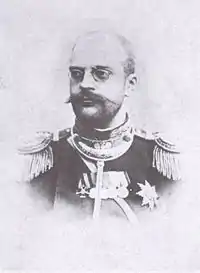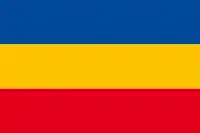Charles Michael, Duke of Mecklenburg
Charles Michael, Duke of Mecklenburg (German: Carl Michael Herzog zu Mecklenburg; Russian: Михаил Георгиевич; 17 June [O.S. 5 June] 1863 – 6 December 1934) was an officer in the Imperial Russian Army, heir presumptive to the throne of Mecklenburg-Strelitz and from 1918 head of the Grand Ducal House.
| Charles Michael | |||||
|---|---|---|---|---|---|
| Duke of Mecklenburg | |||||
 | |||||
| Head of the House of Mecklenburg-Strelitz | |||||
| Period | 23 February 1918 – 6 December 1934 | ||||
| Predecessor | Grand Duke Adolf Friedrich VI | ||||
| Successor | Duke Georg | ||||
| Born | 17 June [O.S. 5 June] 1863 Oranienbaum, Russian Empire | ||||
| Died | 6 December 1934 (aged 71) Remplin, Nazi Germany | ||||
| |||||
| House | House of Mecklenburg-Strelitz | ||||
| Father | Duke Georg August of Mecklenburg-Strelitz | ||||
| Mother | Grand Duchess Catherine Mikhailovna of Russia | ||||
| Religion | Lutheranism | ||||
Life in Russia
He was born in Oranienbaum, Russia, a grandson of Grand Duke Georg of Mecklenburg-Strelitz via his second son Duke Georg August of Mecklenburg (1824–1876) and his wife Grand Duchess Catherine Mikhailovna of Russia, a granddaughter of Emperor Paul I of Russia. Charles Michael studied at the University of Strasbourg and gained a PhD.[1] As he was born into the Russian branch of the Grand Ducal house of Mecklenburg-Strelitz, Charles Michael and his older brother Duke George Alexander, both served in the Russian Imperial Army with Charles Michael achieving the rank of Lieutenant General.[2] When his brother died in 1909 Charles Michael was appointed the guardian of his children Katharina, Marie, Natalia and Georg by Adolf Friedrich V.[3] From 1908 to 1910, he served as the head of artillery in the 1st Army Corps of the Russian Imperial Army.[4]
On 24 June 1914 two weeks after the death of his cousin Grand Duke Adolf Friedrich V, Charles Michael wrote to the new Grand Duke Adolf Friedrich VI informing him that he wished to renounce his rights to the throne of Mecklenburg-Strelitz.[5] On 7 August shortly after the outbreak of World War I he became a naturalised Russian citizen.[5]
In March, 1917 Charles Michael was arrested and made to appear before the Russian parliament the Duma.[6] He later fled to the Caucasus region.[7]
Heir to Strelitz
The Grand Duke of Mecklenburg-Schwerin, Friedrich Franz IV wrote to Charles Michael informing him that his cousin Adolf Friedrich VI of Mecklenburg-Strelitz had died on 23 February 1918 and that as he was first in the line of succession he was being called to the throne.[7] A petition to accept the throne was also sent to Charles Michael by the citizens of Mecklenburg-Strelitz as they wanted to maintain their independence and not be united with Mecklenburg-Schwerin.[7] However Charles Michael never received it so he wrote a private letter confirming his desire to renounce his rights to reign in Mecklenburg-Strelitz although the letter did not reach Friedrich Franz IV, who was acting as regent for Mecklenburg-Strelitz, until January 1919[7] after the fall of the German monarchies. As a result, the succession issue could not be resolved in time and the two Mecklenburg grand duchies became separate free states in the Weimar Republic.
Charles Michael eventually left Russia with his family arriving first in France before going into exile in Denmark.[7] While there he served as Chairman of the Mutual Charitable Society for Russian Officers in Denmark.[8] In 1921 he was paid five million marks by the Mecklenburg government in return for renouncing his claim to the Strelitz throne.[9] In April, 1930 he returned to Germany and took up residence at his estate, Remplin castle.[10]
Charles Michael adopted his nephew Georg, Count of Carlow who was the morganatic son of his older brother Duke George Alexander of Mecklenburg (1859–1909) on 11 September 1928 and confirmed in the courts of Malchin on 5 October 1928.[11] Charles Michael died unmarried in Remplin, Germany and was succeeded as head of the Grand Ducal house by his nephew and adopted son the former Count of Carlow, Duke Georg of Mecklenburg.[12]
Honours
He received the following awards:[13][14]
 Mecklenburg: Grand Cross of the House Order of the Wendish Crown, with Crown in Ore, 17 June 1880[15]
Mecklenburg: Grand Cross of the House Order of the Wendish Crown, with Crown in Ore, 17 June 1880[15].svg.png.webp) Saxe-Weimar-Eisenach: Grand Cross of the Order of the White Falcon, 1884[16]
Saxe-Weimar-Eisenach: Grand Cross of the Order of the White Falcon, 1884[16].svg.png.webp) Russian Empire:
Russian Empire:
- Knight of the Imperial Order of Saint Prince Vladimir, 4th Class, 1890; 3rd Class, 1898; 2nd Class, 1911
- Knight of the Imperial Order of Saint Andrew the Apostle the First-called, 1904
- Knight of the Imperial Order of Saint Alexander Nevsky, 1904
- Knight of the Imperial Order of the White Eagle, 1904
- Knight of the Imperial Order of Saint Anna, 1st Class, 1904
- Knight of the Imperial Order of Saint Stanislaus, 1st Class, 1904
- Knight of the Order of Saint George, 4th Class, 1914
- St. George's Sword, 1915
.svg.png.webp)
.svg.png.webp)
.svg.png.webp) Ernestine duchies: Grand Cross of the Saxe-Ernestine House Order
Ernestine duchies: Grand Cross of the Saxe-Ernestine House Order
Ancestry
| Ancestors of Charles Michael, Duke of Mecklenburg |
|---|
References
- Almanach de Gotha. 1891. p. 55.
- Almanach de Gotha. 1910. p. 61.
- Mecklenburg-Strelitz, Beiträge zur Geschichte einer Region. p. 187.
- 1-й армейский корпус | 1st Army Corps. (in Russian)
- L'Allemagne Dynastique, Tome VI : Bade-Mecklembourg. p. 232.
- "Czar and Czarina are under arrest" (PDF). The New York Times. 1917-03-22. Retrieved 2007-10-28.
- Mecklenburg-Strelitz, Beiträge zur Geschichte einer Region. p. 188.
- van der Kiste, John; Coryne Hall (2004). Once A Grand Duchess. Sutton Publishing. p. 177. ISBN 0-7509-3521-9.
- "Ex-Grand Duke's Record". The Guardian. 1926-01-13.
- "Schloss Remplin", Fitchburg Sentinel, p. 12, 11 April 1930
- L'Allemagne Dynastique, Tome VI : Bade-Mecklembourg. p. 235.
- Mecklenburg-Strelitz, Beiträge zur Geschichte einer Region. pp. 188–189.
....Herzog Carl Michael verstarb am 6. Dezember 1934 in Remplin. Neues Oberhaupt des Strelitzer Fürstenhaus wurde sein neffe Herzog Georg....
- Russian Imperial Army - Duke Karl Michale of Mecklenburg-Strelitz (In Russian)
- Grossherzoglich Mecklenburg-Schwerinscher Staatskalendar, 1908, p. 8
- "Großherzogliche Orden und Ehrenzeichen". Hof- und Staatshandbuch des Großherzogtums Mecklenburg-Strelitz: 1907. Neustrelitz: Druck und Debit der Buchdruckerei von G. F. Spalding und Sohn. 1907. p. 14.
- Staatshandbuch für das Großherzogtum Sachsen / Sachsen-Weimar-Eisenach (1891), "Großherzogliche Hausorden" p. 16
- Erstling, Frank; Frank Saß; Eberhard Schulze; Harald Witzke (April 2001). "Das Fürstenhaus von Mecklenburg-Strelitz". Mecklenburg-Strelitz, Beiträge zur Geschichte einer Region (in German). Friedland: Steffen. ISBN 3-9807532-0-4.
- Huberty, Michel; Alain Giraud; F. et B. Magdelaine. L'Allemagne Dynastique, Tome VI : Bade-Mecklembourg. ISBN 978-2-901138-06-8.
